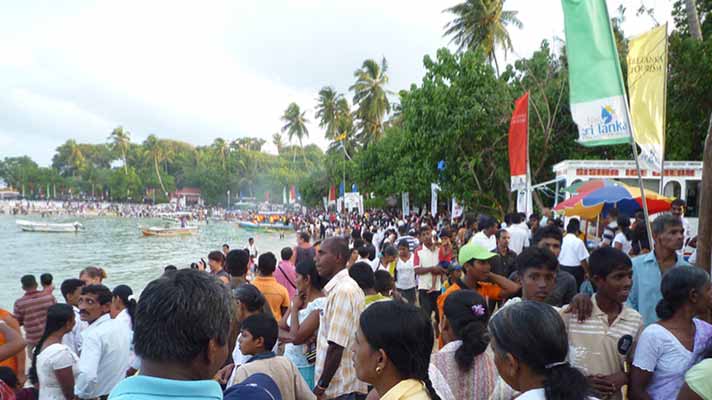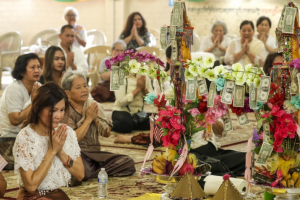Unawatuna beach offers golden sands, blue waters and ample opportunities for the curious tourist to experience Sri Lanka. The picturesque bay area attracts thousands of tourists throughout the year who come in search of surfing, sun and relaxation. Adjoining the humdrum of ordinary life of the beach is the Welle Dewale, or the Temple of the Sands. It sits calmly with 700 years of history as a part of a multi-religious coastal community.
The Welle Dewale has a special feature. Though originally placed as worshiping place for the god Dewol Deviyo, the temple has acquired the worship of Buddhists and other religious believers. The Buddhist temple area lies above Dewol’s ancient dwelling and includes a newly constructed 40-foot seated Buddha statue and a stupa. The full moon day attracts many hundreds of devotees to the temple for worshiping both the Buddha and the god – the former for spiritual freedom, the later for peace and prosperity.
The ordained monks conduct the full moon rituals and other Buddhist ceremonies, while the everyday blessings of Dewol are conferred through two lay priests. These everyday blessings are necessary for the local fishermen, who make it a point to visit the temple early each day to invoke blessings before they paddle out in their fishing trawlers. It is clear that the Temple of the Sands has become the heart of the coastal community through both Buddhism and alternative beliefs.
The legends say that Dewol traveled from South India, accompanied by seven merchant vessels. It is said that his attempts of landing were disrupted by the gods who were already in Sri Lanka. At the end however, he managed to defeat their resistance and land in the Unawatuna jungles, making it his home. According to C. Kumarasiri, the second lay priest of the temple, the building by the beach is the original, which was built over seven hundred years ago. “It wasn’t even damaged by the tsunami of 2004” he say, devotion shining in his eyes. “The chief Buddhist prelate of the Temple is Rev. Talpe Ariyajothi and this temple is one of the nine temples supervised by his superior Rev. Metaramba Somarathana. My head priest is K. B. Chandradasa and he is also a lay priest,” he explains.
Every year in the month of August, the temple holds a festival in honor of the Dewol deity. Thousands of pilgrims visit the beach from all corners of Sri Lanka. During this time, the inner chambers of the temple will be opened to the public and a street procession with a golden statue of the god can be seen in all its beauty. The intention of this annual event is to bless the community in which the Dewol god dwells, while his statues are paraded over the streets accompanied by an entourage of pilgrims. The fishing community in the area considers that such blessings are important for their daily activities and livelihood. Sacred items as decorated paintings of the god Dewol (which were donated by the seafarers) can be seen at the altar of the temple.
Colin Dieck, a former student of Bowdoin College in the United States, has been visiting the temple grounds. “I find the harmony between faiths in this temple fascinating,” He declared. “There should be freedom of belief, and here in this temple I see believers of all three major religions of Sri Lanka unite. It is a special place.”
This sacred space is one of the more homely, down-to-earth examples of a union of local and missionary cultures: here, the deity Dewol and the Buddha are housemates, and the locals are more than happy to have an annual house party on their behalf – good for them!

















